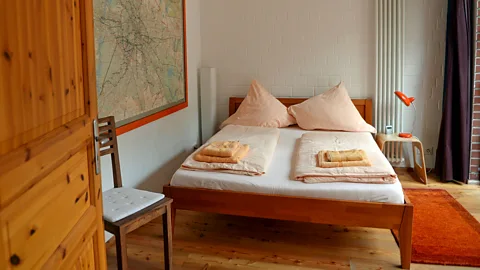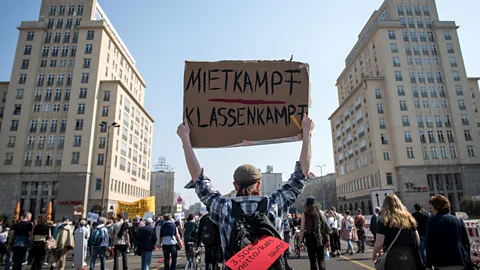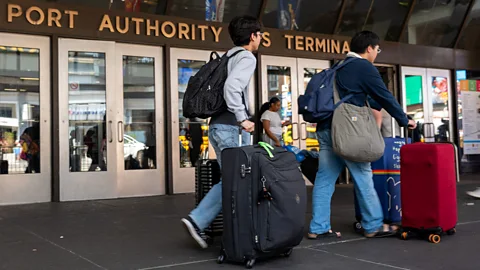
What does a world without Airbnb look like?
- Published By Jane Njeri For The Statesman Digital
- 1 year ago
With Barcelona announcing a total ban on short-term rentals from the end of 2028, how will decisions to curb Airbnb and others in the world's major cities change how we travel?
On 21 June, Barcelona mayor Jaume Collboni announced plans to ban short term rentals in the city starting in November 2028. The decision is designed to solve what Collboni described as "Barcelona's biggest problem" – the housing crisis that has seen residents and workers priced out of the market – by returning the 10,000 apartments currently listed as short-term rentals on Airbnb and other platforms into the housing market.
Barcelona is not the only city to be strongly regulating – or even banning – short-term rentals outright. It has been illegal since September 2023 to rent out an apartment as a short-term let in New York City unless you are registered with the city and you are present in the apartment when someone is staying – a change also made to assuage the city's housing crisis. Berlin banned Airbnbs and short-term rentals back in 2014, bringing them back under tight restrictions in 2018; and in many of California's coastal cities, including Santa Monica, short-term rentals are either banned or highly restricted.
It's all part of a wider theme: around the world, Airbnb – which dominates the short-term rental market with more than 50% of all online bookings – and others, including VRBO, Booking.com and Expedia.com, are being scrutinised at the same time as questions are being asked about who tourism is for, and where the balance lies between benefits for tourists and locals alike.
Since its launch in 2007, Airbnb has been a major disruptor of the travel industry, offering flexible rental accommodation in cities worldwide with a "live like a local" promise that hotels couldn't match. Recent years have seen a backlash against the brand, which is blamed for pushing up housing prices and affecting locals who feel they have been forced to live next door to unregulated hotels. But what do we gain and what do we lose without a short-term rental market in travel?
 Getty Images
Getty Images"Short-term rentals give you a chance to stay in a location [that's] a little more authentic," says Lucy Perrin, commissioning travel editor and hotel specialist at The Times. "It's usually a less clinical, more local experience and obviously prices can be better. They tend to work well with families, groups and more adventurous travellers. Those looking for a safety blanket, where they know exactly what they'll get, tend to stay in a hotel."
It seems clear that taking short-term rentals out of the travel market will result in higher accommodation prices for tourists. "I'd be surprised if hotels don't take advantage of this situation," she adds.
For Caitlin Ramsdale of family travel platform Kid & Coe, there's one obvious loser: families.
"There are many groups for whom hotels as the only option simply doesn't work," she says. "While the hotel industry has done legwork to be accommodating to families, the room layouts and prices don't work for the majority of families (especially those with 2+ kids) trying to take short breaks to cities. There has to be a way to balance the goals of the city while still catering to this segment of travellers – it's a huge loss to parents who want to introduce their children to the world."
The question is: does banning or restricting short-term rentals actually reduce housing prices or affect housing stock? Harvard Business Review's study on the impact of the New York City ban, published earlier this year, concluded that in this case, short term rentals are not the biggest contributor to high rents, and that regulations, rather than bans, would offer better benefits to the city and locals alike. One clear result from the city's ban has been that hotel room rates have hiked to a record average of $300 per night.
 Getty Images
Getty ImagesSo why are tourism authorities and city councils doing it? Perhaps the real reason is that it's not just about the numbers, it's about how local people feel about tourism. Spain is at the epicentre of Europe's overtourism crisis, with locals vocally opposing what they feel is a tourism industry that does not benefit them, in destinations including Malaga, Mallorca and the Canary Islands as well Barcelona itself.
In many ways it feels like an echo of the "second home" debate that has raged in places including Cornwall for decades. In tourist-heavy destinations, where local residents have been routinely priced out of the market, forcing them to live in caravans or commute for hours to work each day, it feels monumentally unfair to find local towns taken over by holiday rentals, unused for part of the year, when they could benefit local people. It's not the only issue causing the housing crisis – stagnant wages, especially for public sector workers, and limited housebuilding programmes are also to blame – but it's arguably the most visible one.
In British Columbia, Canada, Premier David Eby put the issue succinctly as he clarified new short-term rental rules: "If you're flipping homes, if you're buying places to do short-term rental, if you're buying a home to leave it vacant, we have consistently, publicly, repeatedly sent the message: Do not compete with families and individuals that are looking for a place to live with your investment dollars."
Successful on paper or not, these bans send a signal to local people that politicians are listening to their concerns and will prioritise them over tourists.
There is an alternative to outright bans, though. Many destinations, including Berlin, restrict owner-occupiers to a 90-day maximum rental period over a year, effectively allowing part-time hosts to continue to make a supplementary income while preventing professional hosts from buying up housing stock and turning it into full-time short-term rentals. The issue for all countries moving in this direction, including the UK, which proposes something similar, is about regulation. How do you do it and how much extra does it cost to do so?
 Getty Images
Getty ImagesFor travellers, however, the news seems to be overwhelmingly negative. When it comes to limited short-term rentals, hotels and B&Bs look likely to be the main winners, where supply outstrips demand, and they can charge the rates they want without much competition.
But Perrin can see the benefits from an experience perspective. "I think a ban on short-term rentals will make trips to cities like Barcelona more authentic," she says. "When locals are driven out of an inner city, it can lack vibe and culture. This will offer a better experience."
She adds: "I think it will make travellers need to be more inventive with the areas they stay in, and maybe drive them to cities where you can hop between different places. In the long term, I think it will offer a richer experience for tourists and less animosity with locals, which is ultimately a good thing."
Share on
Tags
SHARE YOUR COMMENT
MORE STORIES FOR YOU
Trending Stories
DJ Mo’s former illicit lo...
- Published By Jane
- January 15, 2024
Mapenzi! Zari and Tanasha...
- Published By Jane
- October 24, 2023
Zuchu Speaks on Diamond P...
- Published By Jane
- October 12, 2023
Hio Ni Upumbavu Wasituche...
- Published By Jane
- November 8, 2023
RECOMMENDED FOR YOU
Your Lungs Hold Secrets A...
- Published By The
- September 11, 2025
Better Sleep?: See The Li...
- Published By The
- September 11, 2025
What to Know About iPhone...
- Published By The
- September 11, 2025
From Teacher to Mwalimu N...
- Published By The
- September 11, 2025
Latest Stories
6 Brain-Damaging Habits Y...
- Published By The
- September 27, 2025
"Najua Unatamani": Vera S...
- Published By The
- September 27, 2025
Lenacapavir: What You Nee...
- Published By The
- September 27, 2025
Bahati and Diana Marua An...
- Published By The
- September 27, 2025



